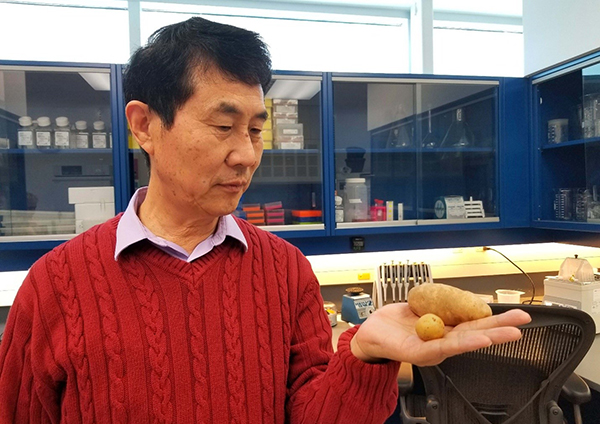Set up an interview
Media Relations
Agriculture and Agri-Food Canada
1-866-345-7972
aafc.mediarelations-relationsmedias.aac@agr.gc.ca
In the classic children’s game, nobody wants to be the one left holding the "hot potato". This also rings true for farmers, as rising global temperatures are bringing new meaning to the term. Producers know that being able to grow potatoes that can withstand heat-stress is becoming increasingly urgent.
Originating from the Andes in South America, potatoes are now a staple food on tables across the globe – and with good reason. One potato with skin is equal to a cup of spinach in iron content, and has as much potassium as an average-sized banana. While the cool temperatures of the Andean highlands were ideal for potato formation, potato crops are feeling the heat in Canada, where recent summers have seen record-breaking temperatures. Helping producers find potato varieties that are more resistant to the potential disruption to growth caused by extreme heat is critical for ensuring the sustainability and profitability of potato production in Canada, which averages 4.5 million tonnes per year.
Recognizing this need, Dr. Xiu-Qing Li, an Agriculture and Agri-Food Canada (AAFC) research scientist with the Fredericton Research and Development Centre, has been studying heat-stress in potatoes for years, leading to a number of breakthroughs in recent years. In 2018, he teamed up with the University of New Brunswick and international collaborators to examine the response to heat-stress in 55 different varieties of potato, the first large-scale study of its kind. In most of the varieties studied, heat stress decreased leaf size, but increased leaf greenness and plant height, while severely reducing potato formation and mass. This study also identified which varieties were most heat-tolerant: Eramosa, Chieftain, AC Belmont, and Superior.
Identifying these varieties was an important first step, but even these potatoes did not fare particularly well in the heat, so it was clear that more research was needed. In 2020, Dr. Li collaborated with AAFC colleague Dr. Benoit Bizimungu, along with researchers from Queen’s University, on a study that went on to be recognized with an Outstanding Paper Award from the American Journal of Potato Research. Their publication, "Effects of earliness on heat stress tolerance in fifty potato cultivars," determined that potato varieties known for reaching maturity early in the field grew at similar rates to later-maturing varieties when these were placed under heat stress in greenhouses, but the heat actually slowed down their maturation process. The research conducted by Dr. Li and his colleagues sought to pinpoint the specific potato genes that might help explain why that is, and the mechanisms that determine whether a potato variety will be early or late to mature.
"Heat stress causes potatoes to react by changing how long it takes them to mature – with more heat actually slowing down their growth. This creates a challenge for farmers in choosing which varieties to grow, determining when they can harvest, and knowing when they can expect to have products ready for market. More certainty about maturation rates could help them select the best variety to produce."
- Dr. Xiu-Qing Li, Research Scientist, Agriculture and Agri-Food Canada
On the heels of this award-winning study, Dr. Li launched and led a new research project to learn still more, taking a deeper dive into the genomic mechanisms of potato responses to heat-stress. In 2020, he identified genes that regulate heat-induced sprouting. Potatoes grown during hot and dry summers often exhibit a defect called "pre-harvest sprouting” or “heat sprouts", which may take away nutrients, change the chemical composition, and reduce the overall quality and marketability of a potato. In this study, 18 different varieties were used to investigate whether heat-stress conditions alone were responsible for the troublesome sprouts. This project confirmed that heat alone was indeed the culprit, and that the natural earliness or lateness of the variety in question had no bearing on whether or not it developed sprouts under stress.
To reach this conclusion, researchers working with Dr. Li dove into the transcriptomic responses of heat-stressed potatoes. Transcriptomic studies involve looking at the genes, gene interaction networks, and mRNA features of a cell to see how they behave when confronted by environmental factors or illnesses, providing a very deep and detailed look into cell behaviour and function. Their study found that genes associated with dormancy reduced activity in heat-stressed potatoes, just as they did in potatoes that developed post-harvest heat sprouts, indicating that plant hormone metabolisms play a key role in heat sprouting. This information will prove useful when it comes to genetically improving potato varieties for tolerance to heat-sprouting.
"What we’ve found will be able to help farmers and processors make the best decisions about how to store and process their heat-stressed potatoes. This is a challenge facing producers around the world, and it has been very heartening to be able to contribute our understanding of the issue and to be able to make evidence-based recommendations."
- Dr. Xiu-Qing Li, Research Scientist, Agriculture and Agri-Food Canada
The study generated important insight into selecting potato varieties for farming, how to best plan for storage and utilization of heat-stressed potatoes, as well as knowledge that will help in breeding heat-tolerant varieties in the future.
Since climate change threatens to bring still hotter, more erratic weather, Dr. Li proposes to conduct more characterization of the varieties under hot summer conditions, and continue to develop integrated strategies in mitigating heat stress risk. This type of research is an invaluable part of mitigating the risk to potato production in Canada, and around the world.
Key Discoveries/Benefits:
- AAFC research has identified varieties relatively tolerant to heat stress in potato mass, heat sprouting and post-harvest dormancy.
- AAFC research has determined the genetic characteristics that contribute to heat-tolerance in potato varieties.
- These insights can help producers and processors select the best varieties and make critical decisions about storage and use of harvested tubers.
Photo gallery

Dr. Xiu-Qing Li in lab, holding potato tubers.